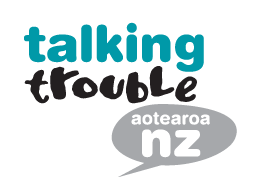The focus of all Talking Trouble's activities is the speech, language and communication needs of children, adolescents and adults who are involved with care and protection, justice, mental health or behaviour services.
Talking Trouble operates as a social enterprise/profit-for-purposes organisation where any profits generated after individuals carrying out work have been paid are used for pro-bono, training or research activities. No owner dividend is taken. Sally Kedge is the coordinator and director of Talking Trouble Aotearoa NZ (Talking Trouble) which was registered as a limited liability company in October 2015. Talking Trouble had until that time been a project with no official status as a company or charitable trust that had been started by Sally Kedge, Dr Linda Hand and Dr Clare McCann. Dr Hand has now retired. Dr McCann continues to be an academic advisor to Talking Trouble and she and Sally are engaged in some research projects that are carried out jointly between Talking Trouble and The University of Auckland. Sally is an Honorary Academic in Speech Science at the University of Auckland.
Currently Talking Trouble is coordinated by Sally Kedge who contracts 31 highly specialised and experienced speech-language therapists to carry out the following activities:
Court-appointed Communication Assistant roles in Youth, District and High Courts and Tribunals for witnesses or defendants who need assistance with understanding and participating in these settings, plus similar roles in other settings e.g. Family Group Conferences, Police interviews, Parole Board Hearings.
Workforce professional development and training.
Clinical speech-language therapy assessments and interventions.
Research and evaluation.
Consultation, e.g. working parties for Communication Assistants.
The mission, vision and values that drive Sally’s work at Talking Trouble are below:
VISION: A world where everyone can participate in the interactions and decisions that are important to them.
VALUES:
Equity
Excellence
Collaboration
Creativity
About Talking Trouble
MISSION: Building communication capacity and accessible communication environments.
We motivate and support change in how people communicate with each other.
Talking Trouble's speech-language therapists (SLTs) are passionate about improving Aotearoa New Zealand’s response to the speech, language and communication needs experienced by many children, youth and adults involved with care and protection, justice, mental health and behaviour services.
Talking Trouble’s specialised, practical and energetic speech-language therapists provide clinical services, research, professional training and consultation, and deliver court-appointed Communication Assistance roles in legal settings. A compassionate, collaborative, creative and innovative approach focussing on excellence is taken by the team who are persistent, pragmatic and solution-focussed. Life-long learning and critical thinking is highly valued, and all team members are required to undertake ongoing professional development and cultural supervision.
Aotearoa is a colonised country. Tāngata Whenua Māori have been oppressed and marginalised for over a hundred years by systems, policies, attitudes and religion. Loss of language, land, kawanatanga and rangatiratanga have caused trauma for tangata whenua Māori and relate to inequities in health, housing, education and justice. As Director of Talking Trouble, Sally recognises Te Tiriti o Waitangi Māori text. Talking Trouble has engaged Kōrero Connect, a Kaupapa Māori speech-language therapy consultancy run by Tracy Karanui-Golf to work in parternship to develop Talking Trouble’s Te Tiriti o Waitangi policy. When this work is finished (in early 2025), it will be published on the Talking Trouble website and be the foundational policy on which all our other policies are based.
Many of the whānau the Talking Trouble team works with are Māori and services they need to receive must be safe, excellent and effective, and anything that is unsuitable and/or racist addressed.
There is a very small number of Māori SLTs in Aotearoa and those SLTs are often under enormous pressure. At Talking Trouble, we are dominated by non-Māori SLTs and the practices, frameworks and professional influences that have dominated are not indigenous and have been mainly derived from Tauiwi and overseas influences.
In response to this, Tracy Karanui-Golf from Kōrero Connect has been engaged to work on a range of projects and Kapa Māori is a formalised pathway for supporting our Māori rōpū funded by Talking Trouble. The purpose of the Kapa is for Māori SLTs within Talking Trouble to have opportunities to connect as a group and to protect the future of Māori SLT spaces. Kapa Māori provides opportunities to explore possibilities, critically appraise and grow practices, confidence and skills so they can work as Māori as SLTs/CAs. This rōpū determines what is discussed and how the Kapa goes about the mahi in this space – as Director, I acknowledge this is a Tino Rangatiratanga sphere founded on the values and principles of mātauranga Māori.
Talking Trouble requires team members to maintain all the requirements of registered members of the New Zealand Speech-Language Therapists’ Association. In addition, all SLTs in the team are required to have regular cultural supervision. Talking Trouble contracts Tracy Karanui-Golf from Kōrero Connect to provide clinical supervision through a cultural lens using her model, Wā Whatu.
